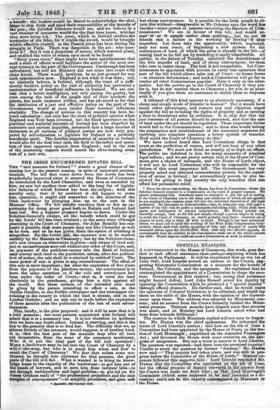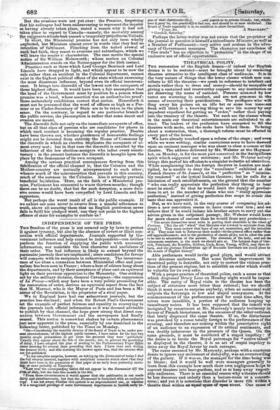OFFICIAL EVASIONS.
A co/cranes:now in the House of Commons, this week, goes far- ther to sink official statesmen than-perhaps-anything which has happened in Parliament. It will he recollected that on the 1st of -.Tune 1847, Lord Lincoln moved an address to the Crown, sug- gesting Systematic Colonization as a measure- for the benefit of Ireland, the Colonies, and the emigrants. He explained that he contemplated the appointment of a Commission to shape the mea- sure. Government at first resisted ; but, seeing that resistance might hazard defeat, Lord John Russell saved his dignity by opposing the Commission while he promised a "special inquiry" through official channels. He further said, that he would cause the opinions of Colonial Governors to be collected, and would lay them on the table of the House,,with the opinion of the Govern- ment upon them. The address was adopted by Ministerial con- sent ; and an answer from the Crown formally ratified the Minis- terial promise. Thirteen months have elapsed since that promise was made, and on Monday last Lord Lincoln asked what had been done towards fulfilment ?
The manner in which Ministers replied will not soon be forgot- ten. Mr. Hawes was the chief spokesman. He _reiterated the terms of Lord Lincoln's motion' told how on the 4th of June a Committee had been appointed by the House of Peers, on the mo- tion of Lord Monteagle ; expatiated on the Amended Passengers Act ; and favoured the House with some statistics on the pro- gress of emigration. But not a word in answer to Lord Lincoln. The question was repeated—had there been the promised inquiry? Unable to avoid the question by further "fencing," Mr. Hawes now said—" That inquiry had taken place, and was still in pro- gress before the Committee of the House of Lords." tuttaut ex- posure followed this suggestio falsi : Lord Lincoln reminded Mr. Hawes that the Committee was appointl on the 4th of June, but the official promise of inquiry couvd in tbe answer from the Crown was made ten days later ; so Itbat .d. Monteagle's Committee (which some supposed to be half iiad4 as a di- version) could not be the inquiry contemplated isters pr the House.
But the evasions were not yet over: the Premier, forgetting that his colleague bad been endeavouring to represent the inquiry as having already taken place, stated a reason why it had not taken place in regard to Canada—namely, the mortality amuse the emranitakta4.. • • e4&4-esafth -a tem pinulypre)utticciafiad a.
In ihint, the Ministerial promise has not only been wholly
neglected, but Ministers almost avow in words that they had no intention of fulfilment. Flinching from the naked avowal of such bad faith, they resort to evasions and subterfuges, which we will leave the reader tir, characterize. The case merits the special notice of Sir William Molesworth; whose motion on Colonial Administration stands on the Notice-paper for the 25th instant. Practices such as those which LordOeorge Bentinck and Lord
Lincoln have dragged to light, and which appear to be now the rule rather than an accident in the Colonial department, cannot exist in the highest political offices of the state without exercising the most disastrous influence, bc7ond even its official inconveni- ence. It brings into discredit of the lowest sort the occupants of those highest offices. It would have been a fair assumption that the head of the Government must by position be a person whole promise was a bond, whose assertion was an authoritative proof: these melancholy exhibitions correct that notion. Henceforth it int* not be presumed that the word of officers so high as a Pre- mier or an Under-Secretary of State are to be taken in the plain sense. On the contrary, in regard to one particular branch of the public service, the presumption is rather that some deceit and evasion are meant.
The discredit falls not only on the immediate occupants of office, but on all that class of persons who are candidates for places in trIiith such conduct is becoming the regular practice. Doubts have been thrown out, whether gentlemen of honourable feelings might not be deterred from entering the House of Commons by the discredit in which an election ithplicates the occupants of .al- most every seat; but in that case the discredit is entailed by the behaviour of the low election-mongers who infest every consti- tuency: in the present instance the discredit is brought upon the place by the demeanour of its own occupant. Among the serious practical consequences flowing from this falsification of the official channel is, that the Colonies and the Mother-country are mutually misrepreSented to each other ; 'whence much of the misconception that prevails in this country, much of the soreness in the Colonies. Also it actually prevents beneficial legislation. "Here, on the faith of a Ministerial pro- mise Parliament has consented to waste thirteenrnonths; though there can be no doubt, that but for such deception, a more deei- sive course would have been compelled by Lord Lincoln and his rs.
sullreperhaps the worst result of all is the public example. If we exhort our sons never to swerve from a manful adherence to truth, above all assuring them that an English gentleman never fails to fulfil his pledged word, can they not point to the highest officers of state for examples to confute us



























 Previous page
Previous page